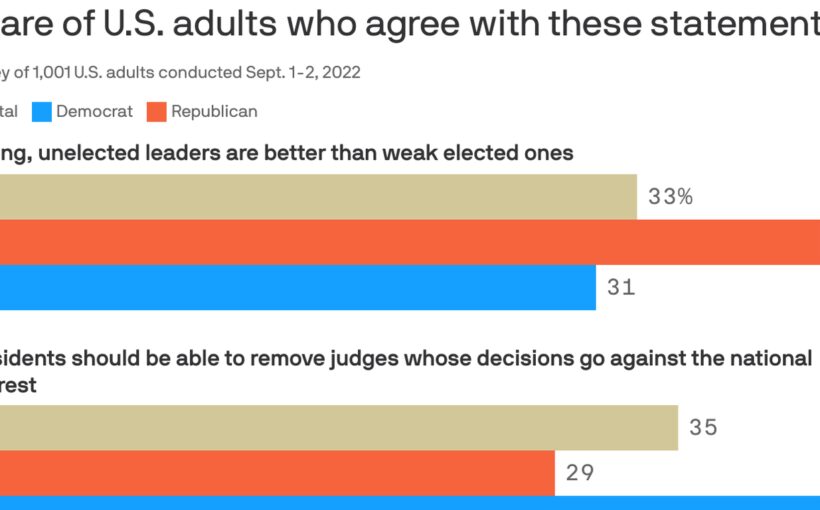About one in three Americans prefers strong unelected leaders to weak elected leaders and says presidents should be able to remove judges over their decisions, according to the latest findings from our Axios-Ipsos Two Americas Index.
Why it matters: The findings from this poll shatter the myth that Americans overwhelmingly agree on a common set of democratic values around checks and balances on elected leaders, protection of minority rights and freedom of speech.
- They're also a reality check against President Biden's speech that portrayed threats to democracy as solely driven by Republican supporters of former President Trump who refuse to accept that he lost the 2020 election.
What we're watching: In this poll, significant minorities of Republicans and Democrats supported non-democratic norms in about equal percentages — and Democrats were more likely than Republicans to say presidents should be able to remove judges when their decisions go against the national interest.
- Many Americans also believe the government should follow the will of the majority even at the expense of ethnic and religious minority groups' civil rights.
- And roughly a third said the federal government should be able to prosecute members of the news media who make offensive or unpatriotic statements.
- Respondents younger than 35 or with household incomes below $75,000 a year were more likely to favor strong unelected leaders and to support prosecuting the media or empowering presidents to remove judges.
The big picture: If you're looking for good news in this poll, it is primarily that the people who embrace the anti-democratic views are still in the minority.
- But the findings are a reminder that for all of the attention and congressional hearings around the Jan. 6 Capitol riot, anti-democratic views take many forms.
What they're saying: "There's a lot of anti-democratic sentiment, a lot more than we might have expected," said Justin Gest, an associate professor at George Mason University who studies the politics of demographic change and advises the project.
- The survey's questions pose "hard tests" for society, Gest said — tradeoffs between "what's expedient and best for the individual, and what actually sustains the integrity of our political institutions."
- Values like minority rights, separation of church and state and freedom of the press are "key foundations" of democracy but "they're far from being fully supported by Americans," Gest said. "These are things you'd think would be universal."
By the numbers: One in three surveyed agreed that it's better to have a strong, unelected leader than a weak elected leader — with a larger share of Republicans (42%) than Democrats (31%) sharing that view.
- With judges, it was Democrats who outnumbered Republicans: 42% of Democrats agreed that the president should be able to remove judges when their decisions go against the national interest, compared to 29% of Republicans and 35% overall. That may reflect the conservative majority on the Supreme Court, and its decision earlier this year overturning Roe v Wade.
- More than a third of Americans (38%) agreed that the government should act in the interests of the majority even if it conflicts with ethnic and religious minority groups' rights, with Republicans (39%) and Democrats (38%) agreeing at roughly the same rate. The question doesn't specify which ethnic or religious minorities.
- 28% said the government should consult religious leaders before making decisions — including 33% of Republicans and 24% of Democrats — while 57% disagreed.
- A third of Americans — 34% among both Republicans and Democrats — said the federal government should have the power to prosecute members of the news media who make offensive or unpatriotic statements. A slight majority (51%) disagreed.
Methodology: This Axios/Ipsos Poll was conducted Sept. 1-2 by Ipsos on their online survey panels in English. This poll is based on a sample of 1,001 general population adults age 18 or older, weighted on age, gender, race/ethnicity, education, and location to be nationally representative.
- The credibility interval is ±3.8 percentage points for results based on the entire sample of adults.
Source: Read Full Article
